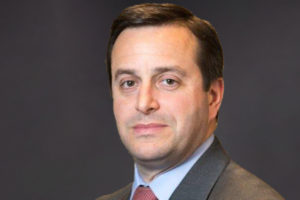Having spent nearly 30 years in global financial services, I’ve seen the market significantly evolve as regulation and globalisation have advanced and the needs and demographics of high net worth (HNW) individuals and their families have changed, says Stuart Parkinson, group chief executive of Lombard International Group.
Previous ‘black swan’ events have driven much of this change to date, and the covid-19 pandemic is no exception in this respect, with the global lockdown and turbulent financial markets encouraging innova-tion and new ways of operating for all businesses including financial advisers and wealth managers.
This has taken on a personal note for me, having become global chief executive of Lombard International Group during the lockdown period.
Instead of embarking on my first official road trip to our European head office in Luxembourg, on to visiting our US team in Philadelphia and New York, then to Singapore and Hong Kong, I found myself in my study at home in the UK, at the mercy of virtual technology.
At the same time, it has been fascinating to observe how the industry has reacted to this global crisis and is adapting to the world’s ‘new normal’.
What lies ahead?
Globally, HNW investors have been quite pragmatic about their personal investments, portfolios and estate planning, maintaining their composure and avoiding knee jerk reactions. They have stayed invested and backed the markets to bounce back, recognising that there are opportunities to leverage.
However, in terms of financial adjustments, just under a quarter of millionaires in the UK and US have changed their personal finance/investment strategy in response to the outbreak.
Recent research also shows that only 5% of high net worth individuals in Switzerland sold equities between mid-February and late April. Indeed, almost a quarter took advantage of the volatility to buy into the markets.
During the current pandemic it might seem like cash is king, but with interest rates likely to remain significantly low or negative for the next few years, HNW investors and family offices will have the challenging task of protecting, preserving and growing wealth.
This appetite for yield will lead to increasing interest in alternative asset classes such as private equity, debt and credit, along with real estate and infrastructure.
In a continued period of uncertainty, such moves will have the additional benefit of decorrelation and diversification, but the popularity of such investment decisions risks a backlog of capital.
At the beginning of this year, private equity was estimated to have around $1.5trn (£1.2trn, €1.34trn) ready to be invested, and this may well rise if investing opportunities are exhausted.
The world has never been more unpredictable and complex
History has shown that while advisors and investors are clearly aware that rare events can occur, they have consistently underestimated their probability. And, with uncertainty and complexity on the rise, it’s important to be guiding investors and providing the right solutions tailored to the current market context.
More than $15trn in wealth is set to be transitioned from one generation to the next, globally, by 2030, but only 51% of UHNWI clients currently have robust succession plans in place. So, there’s an opportunity for wealth advisers to support these individuals.
Families are galvanised into change by the current crisis, providing the impetus to ensure that financial planning is robust and fit to take care of their children and grandchildren.
Prior to this current crisis, we were already seeing clients and HNW investors focused on planning, preserving and passing on wealth and, with volatile global markets and a heightened awareness of mortality adding to the challenge, this need is accelerating.
Achieving these goals requires expertise and strategic solutions and there are significant variations amongst generations in their priorities, aspirations, expectations, and attitudes towards what they want to achieve. However, across the UK and the US, nearly half of advisers only meet their primary clients’ heirs less than once a year and overall, 12% say they never meet their clients’ heirs.
In a post-covid-19 world, wealth structuring and intergenerational planning is only going to become more complex, with increased regulation, an inevitable tax squeeze, and more onerous reporting requirements adding to the existing challenges.
Ensuring the right type and level of connectivity, and then bringing together the right partner to achieve clients’ multi-jurisdictional and multi-generational goals, is imperative.
Global and technological connectivity is crucial
When it comes to connectivity, the HNW sector is a curate’s egg. Hyper-mobile, time poor, and geo-flexible, it is essential that these clients can connect, oversee, and communicate whenever and from wherever as required.
But this cohort typically have greater expectations around personalisation, appreciating the exclusivity and couture nature of their strategic wealth planning. This perhaps goes some way to explaining why the engagement on wealth management apps is among the lowest of all industries.
There is a general dissatisfaction about digital capabilities in the wealth industry. Only about a quarter of clients use their firm’s mobile apps, whether they are self-directed investors or in a full-service relationship with an adviser.
Furthermore, 46% of wealth advisers were dissatisfied with their digital solutions to clients and 86% of them consider servicing clients as a highly important digital capability to acquire going forward.
In addition, a recent survey by MyPrivateBanking reported 73% of millennial HNWIs are unimpressed with their wealth manager’s digital app. While Millennials are often the focus of the move to digital, the reality is that Generation X+ users are following fast behind when it comes to this shift away from traditional interactions to digitally enabled services.
The importance of digital communication resonates loudly, with around half of wealth management mobile app users indicating that the ability to send and receive secure messages is the most important communication tool provided by the app. Wealth advisers too are underwhelmed by the industry’s digital offering.
Innovative communication
In a world where traditional face-to-face interaction is currently problematic, providing innovative communications solutions to those throughout the main epicentres of wealth is paramount.

Periods of uncertainty such as the one we’re currently experiencing, while challenging, are often a gateway to bringing in more clients to the industry. Some advisers are globally experiencing incoming client queries that are more than 30% higher than usual, but this does mean that a core consideration must be in delivering a comprehensive digital communication offering.
Paraphrasing Jean Monnet, people only accept change when they are faced with necessity and only recognise necessity when a crisis is upon them. It remains to be seen what form the industry takes post-covid-19, but it’s clear that a robust digital framework will sit at its heart.
Those that succeed in the new environment will be those that can ensure that the strategic and engagement priorities of their clients are fully met, wherever they are in the world.
This article has been written for International Adviser by Stuart Parkinson, group chief executive of Lombard International Group.








